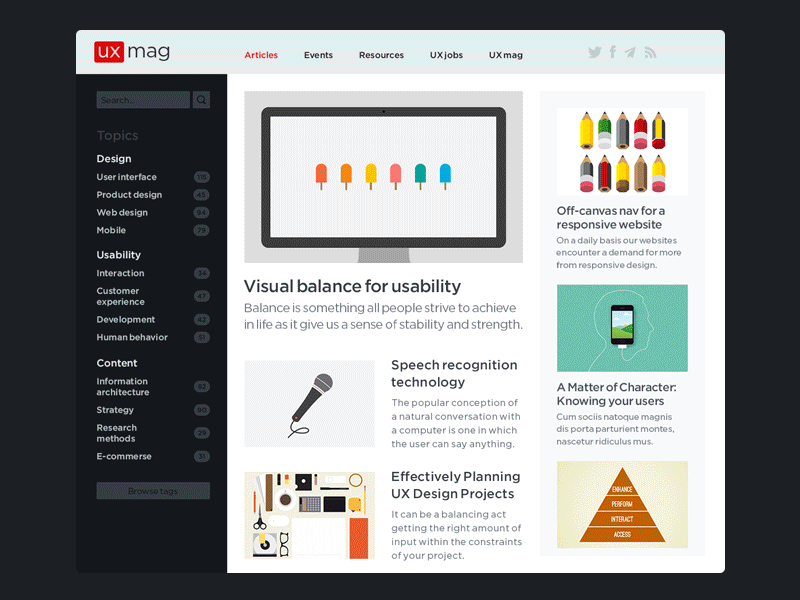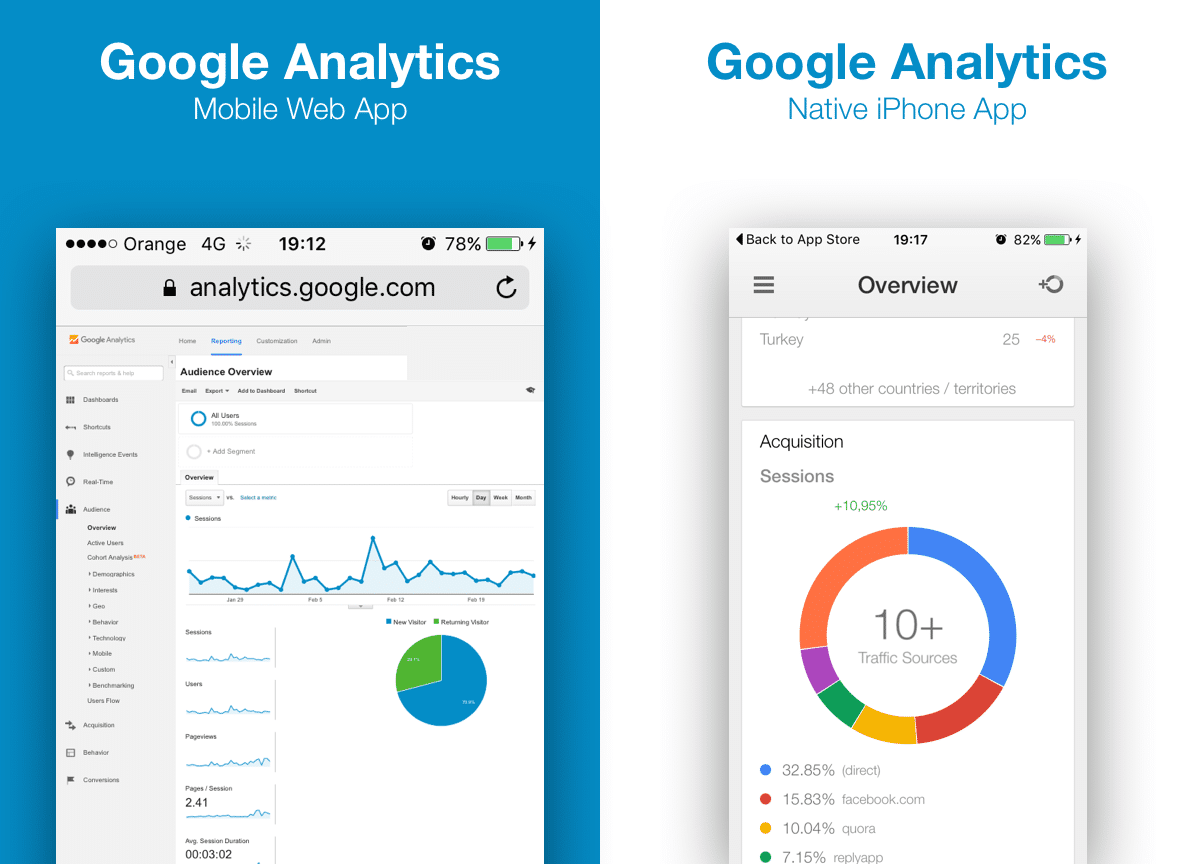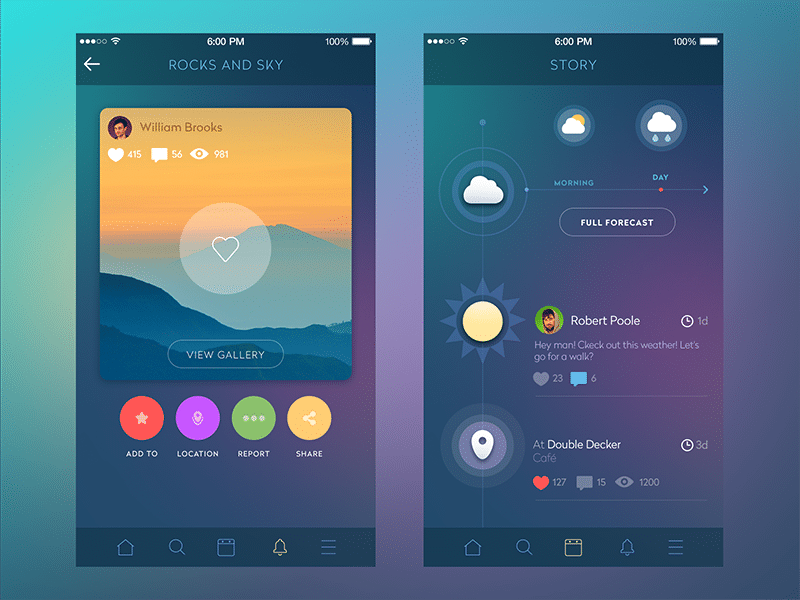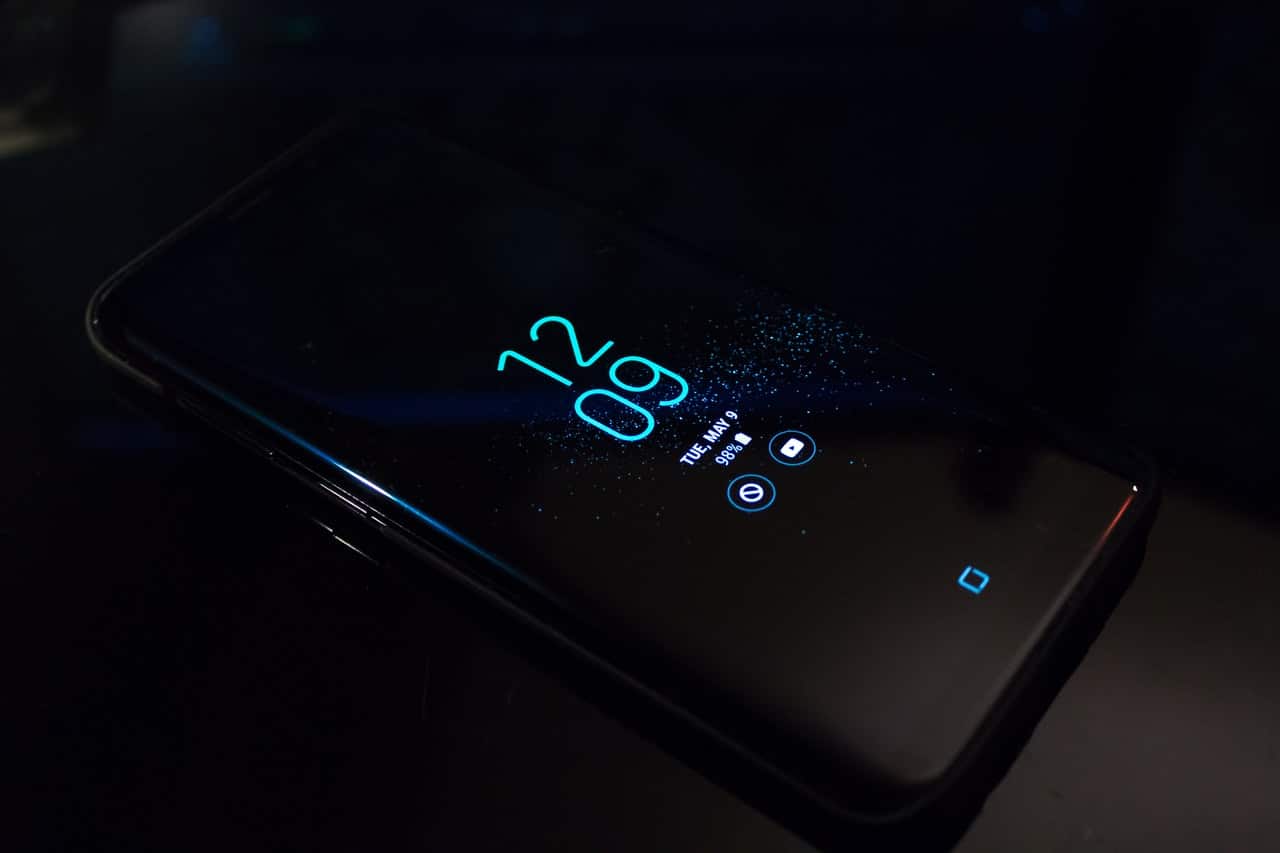The “mobile app vs mobile website” dilemma is well known to anyone who wants to establish a mobile presence. Of course, it’s always possible to convert a website to a mobile app, yet, in the beginning, you usually have to choose only one path to follow. Which one is best for you? That’s what we’re going to find out. Read on!
Everything You Should Know About Mobile Website Development
Before we highlight pros and cons of websites, let’s take a look at the following definition:
A mobile website is a set of linked together browser-based HTML pages that users can access over the Internet.
However, this description isn’t comprehensive because it doesn’t emphasize the differences between desktop and mobile sites. But are there any?
EXAMPLE OF THE RESPONSIVE DESIGN (IMAGE BY CHRIS BANNISTER)
Yes, and the most obvious one is a screen size. With the broad diversity of devices (from 3’ phones to 17’ laptops) owners of web pages have to adjust their websites to different resolutions and screen proportions. Modern websites that are able to adapt to these conditions are called responsive.
What Are The Other Advantages Of Websites?
Despite applications are taking over, both sides still have arguments in the “app vs website” dispute. Which ones play into the hands of sites? Take a look:
1. It Does Not Matter What Operating System You Have
One of the most vivid advantages of the sites is a free (in all meanings) access. If the app may be available only on a specific platform – for example, Android – there is nothing that can be done by iOS users to use it too. However, you can easily access a website from a device with any OS – whether it’s Android, iOS or Windows Phone.
2. Forget About Downloading And Installing
Secondly, users have to download and install an app before they can use it. Besides it takes some time, an app will also occupy a part of device’s memory. What does it mean? It means there may occur some situations when you just won’t have enough space to install a new app. Yet, this problem disappears when we’re talking about websites.
IT’S POSSIBLE TO ACCESS A MOBILE WEBSITE FROM ANY OS (IMAGE BY GHANI PRADITA)
3. Easy Updating Process
It’s impossible to create a perfect product on the first try. Anyway, you’ll have to fix some bugs or update your website and mobile app afterward. However, the main difference here is that it’ll take less money & time to update a website compared to a mobile application. Moreover, you can implement changes so your users may not even notice the process of updating. On the contrary, they have to install every new version of the app if they want to see any changes.
However, everything can’t be so perfect as it seems, right? But I won’t dwell on disadvantages of a mobile app or a website. Why? Because advantages of the one approach are disadvantages of another. For example, if I mentioned that the “easy updating process” is the advantage of websites, it means that mobile apps, unluckily, have more complicated updating process.
Let’s better find out when a website is the better solution for you!
When To Choose A Website?
Despite each case should be treated individually, we have some tips for you that will help you to choose a winner in this mobile app vs website debate. Talking about the latter, there are some cases when it may be reasonable to go Web at first. For example:
- If you’re going to build an online presence for your small business, you may consider websites as the starting point. It would be easier for you to build and promote your mobile app if you already have a website, so count it as an option.
- Very strict (and small) budget is another argument in favor of sites. Why? Because they’re usually cheaper.
- Internet sites also rule when you don’t expect any sophisticated functionality from your product. A simple landing page or a site that provides only some information to its users are not worth the effort to turn them into applications.
Choosing Mobile: What Are The Differences Between A Website And An App?
Yet, with the increasing number of mobile users, apps play a more significant role than ever before. Moreover, as I said earlier, a tailor-made mobile application is not the same as a “website but for a smaller screen”. Why not? You will understand after we review main advantages of mobile apps over websites. Read on!
4 Great Reasons To Build An App Instead Of A Site
Despite mobile applications have some disadvantages, the number of their positive qualities is definitely greater. What are they? Let’s find out!
1. Better UX
This one advantage may be enough to announce applications as a winner in the “responsive website vs mobile app” competition. For mobile users an app is better from any point of view: it works faster and smoother; it has a more user-friendly interface; it provides users with more possibilities.
In order not to be unfounded, take a look at the difference:
WHICH ONE LOOKS BETTER? THE ANSWER IS OBVIOUS. (IMAGE BY MATT WARCHOLINSKI)
2. Utilize Hardware Components & Native Features Of Devices
Another argument when choosing between a website and a mobile app in favor of the latter is a set of unique mobile-only features. These may include:
- a smartphone camera to take photos or scan QR-codes;
- a gyroscope, a microphone and geolocation services;
- other different sensors;
- push notifications.
So if at least one of these features is crucial for you – consider mobile as a more appropriate platform for you.
3. It’s Possible To Access An App In The Offline Mode
To open your website users must have a stable Internet connection (and many of them obviously don’t have it 24/7). However, many applications don’t need a permanent connection and can provide users with all the features in the offline mode. Take Spotify, BBC news or Google Maps as examples!
So in this app vs website duel, the first one is a winner.
4. Enjoy A Pixel-Perfect And User-Friendly Design
When building a native app, mobile developers always pay attention to features of the specific platform. The position of the buttons, proportions, colors and the overall concept – it all plays an inconspicuous, but important role for any user. That’s why bespoke applications always look more user-friendly and nice than even well-done sites.
ONLY A NATIVE APP CAN HAVE SUCH A PIXEL-PERFECT DESIGN (IMAGE BY SERGEY VALIUKH)
So, When To Choose A Mobile Application?
If you’re still pondering what to choose between responsive website vs mobile app, let me lay it all out for the last time. So, you’d better build an application if:
- you want to deliver the perfect UX and care about the speed and smoothness of work of your product;
- it’s crucial for your users to have an offline access to the app or utilize special features (like a camera, a microphone and push notifications);
- you want to develop a game, a deeply personalized app (like EverNote), a social media or a to-do list – all these apps are recommended to be built on a mobile platform;
- you care about the design and want it to look perfect.
So, what is the conclusion?
Conclusion
The choice between a mobile app or a website depends on many factors. In this article, I tried to explain which ones may affect you the most and how you should think in order to avoid mistakes.
If you are interested in even more website-related articles and information from us here at Bit Rebels then we have a lot to choose from.





COMMENTS